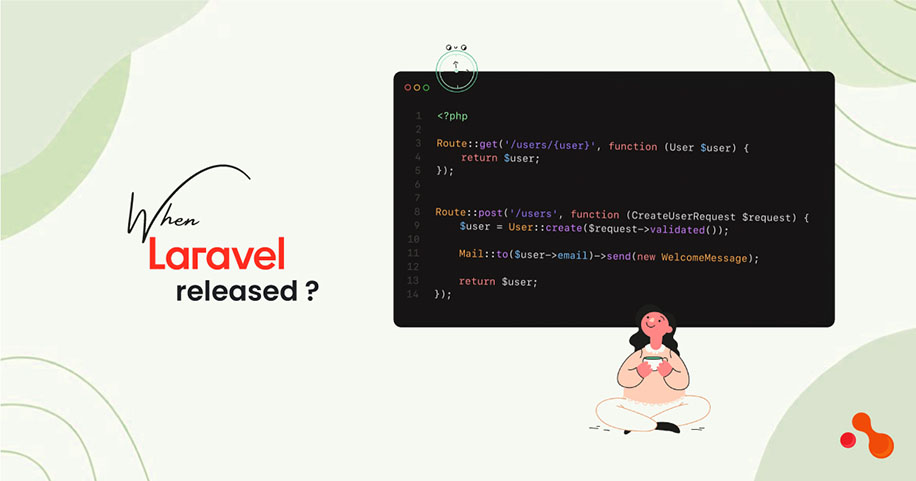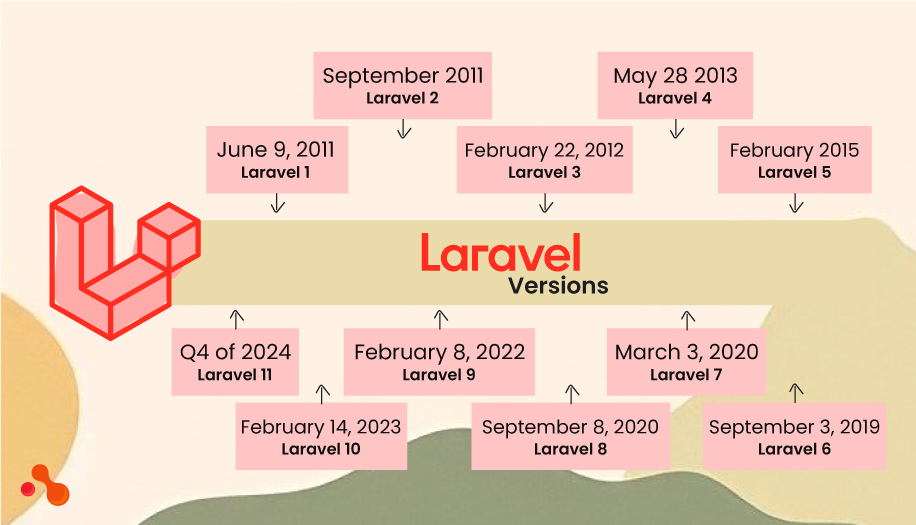Table of Contents
When was Laravel released?

Laravel was first released on June 9, 2011. To make an advanced alternative to the CodeIgniter framework, Laravel was developed. Taylor Otwell, a software developer from the US, developed Laravel to make it more elegant and efficient while offering robust features and modern development practices.
Since its initial release in June 2011, Laravel has gained significant popularity within the PHP community. It continues to evolve and improve, with the latest update, Laravel 10, released on February 14, 2023.
Versions of Laravel

Laravel 1
The initial release of Laravel 1, released on June 9, 2011, built a foundation for building web applications using PHP. Being the initial release, it had a limited set of features compared to later versions of Laravel. Laravel 1 included built-in authentication and authorization support, Models, eloquent ORM for database operations, a simple routing mechanism, Views, Sessions, and caching.
Laravel 1 release date: June 9 2011
Laravel feature list
When Laravel was initially released, it packed a range of features that made it stand out as a modern and elegant PHP framework for web development. Here are the key features and components that Laravel offers:
1. Elegant Syntax and Developer-Friendly Experience:
The clean and expressive syntax for writing PHP code.
Designed to provide a more enjoyable and readable coding experience.
2. MVC Architecture:
Followed the Model-View-Controller (MVC) architectural pattern.
Separated application logic, presentation, and data manipulation for better organization and maintainability.
3. Routing System:
Powerful and flexible routing system for defining clean and SEO-friendly URLs.
Allowed developers to map URLs to specific actions and controllers.
4. Blade Templating Engine:
Intuitive and feature-rich templating engine.
Supported template inheritance, sections, and reusable components for building modular views.
5. Database Interaction:
Fluent database query builder for building and executing database queries using a chainable syntax.
Supported multiple database systems, including MySQL, PostgreSQL, and SQLite.
6. Eloquent ORM:
Object-Relational Mapping (ORM) system for simplified database interaction.
Provided an expressive syntax to define database relationships and perform CRUD operations.
7. Artisan CLI:
Command-line interface with pre-built commands for automating common tasks.
Allowed developers to generate boilerplate code, run migrations, and manage application structure.
8. Authentication and Authorization:
Built-in support for user authentication and authorization.
Allowed developers to handle user registration, login, and access control easily.
9. Caching:
Configurable caching system for storing frequently accessed data.
Supported various caching drivers, including file, database, and memory-based caching.
10. Validation:
Built-in validation system for validating user input.
Allowed developers to define validation rules and easily handle validation errors.
11. Error Handling and Logging:
Comprehensive error handling and logging mechanisms.
Provided detailed error messages and logs to aid in debugging and troubleshooting.
12. Security Features:
Integrated security features, including cross-site scripting (XSS) protection and secure password hashing.
13. Session Management:
Built-in support for managing user sessions and session data.
14. Testing Support:
Provided a testing environment and tools for writing unit tests and performing application testing.
15. Localization and Internationalization:
Built-in support for managing multiple languages and translations in the application.
16. Integration with Third-Party Libraries:
Seamless integration with popular third-party libraries and packages.
Leveraged Composer as the dependency manager for easy integration and package management.
17. Documentation:
Comprehensive and well-organized documentation with clear explanations and examples.
Laravel 2
Laravel 2 was released in September 2011, an improved version of the initial release of Laravel 1. The second major release of the Laravel framework introduced several new features and improvements compared to Laravel 1, as this update now included d support for controllers, making Version 2 with full MVC Complaint.
The new sets of features included Blade templating system too. One limitation of this framework is that it does not support third-party modules.
Laravel 2 release date: September 2011
Laravel 2 feature list
Database migrations for version-controlled database schema changes
Enhanced routing system with advanced features like named routes and route grouping
Unit testing suite for writing tests
Improved documentation compared to the previous version
Enhanced security features including input validation and XSS protection
Additional helper functions for common tasks
Laravel 3
Laravel 3 was released on February 22, 2012. Version 3 was an update with many more features like Artisan, also known as Command Line Interface (CLI). The other important features included database migrations, unit test integration, session drivers, database drivers, Bundles, and support for handling events.
As Version 3 is packed with so many useful features with stable release helped, it to gain more popularity and resulted in more developers shifting towards Laravel.
Laravel 3 released date: February 22 2012
Laravel 3 feature list
Modular structure for better customization and extensibility
Enhanced routing system with enhanced flexibility and control
Database query builder for fluent and chainable database interactions
Bundles for packaging and sharing reusable code
Enhanced error handling and logging capabilities
Improved documentation compared to the previous version
Laravel 4
Laravel 4 was a major release of the Laravel framework and brought significant improvements and new features. Laravel 4 was released in May 2013 and is also known as codenamed Illuminate.
Laravel 4 released date: May 28 2013
Laravel 4 feature list
Composer integration for dependency management
Enhanced routing system with filters and named routes
Enhanced authentication and security features
Queueing system for background task processing
Improved testing support with a dedicated suite
Laravel 5
Laravel 5 was introduced in February 2015 due to significant internal modifications, resulting in a decision to rename the upcoming release of Laravel 4.3.
Laravel 5 introduced several new features, such as Laravel Homestead, Laravel Valet, Laravel Echo, and Laravel Broadcasting. Additionally, it significantly improved existing features like authentication, Artisan commands, Blade templating engine, Eloquent ORM, Query Builder, middleware, and many others. These enhancements further solidified Laravel as a comprehensive and powerful PHP framework for web development.
Laravel 5 released date: February 4 2015
Laravel 5.1 released date: June 9 2015
Laravel 5.2 released date: December 21 2015
Laravel 5.3 release date: August 23 2016
Laravel 5.4 released date: January 24 2017
Laravel 5.5 released date: August 30 2017
Laravel 5.6 released date: January 7 2018
Laravel 5.7 released date: September 4 2018
Laravel 5.8 released date: February 26 2019
Laravel 5 Feature list
Laravel Homestead: A pre-packaged Vagrant box for Laravel development environments.
Laravel Valet: A lightweight development environment for macOS.
Laravel Echo: A JavaScript library for real-time event broadcasting.
Laravel Broadcasting: Built-in support for broadcasting events over WebSockets.
Laravel Scheduler: A task scheduling system for automating recurring tasks.
Laravel Events and Listeners: An event-driven system for decoupled application components.
Laravel Form Requests: Simplified form validation and handling.
Laravel Middleware: Improved middleware support and customization.
Laravel Database Seeding: A convenient way to populate databases with dummy data.
Laravel File Storage: A unified API for managing file systems.
simplified method injection
Array validation
Server monitoring
Laravel 6
Laravel 6 was released on September 3, 2019, and introduced new features such as Laravel UI, Laravel Vapor, and Laravel Nova to enhance the development experience. It significantly improved existing features like Artisan commands, Blade templating engine, Eloquent ORM, Query Builder, migrations, caching, localization, and task scheduling.
Laravel 6 released date: September 3 2019
Laravel 6 Feature list
Semantic Versioning
Laravel Vapor Compatibility
Improved Exceptions Via Ignition
Improved Authorization Responses
Job Middleware
Lazy Collections
Eloquent Subquery Enhancements
Laravel UI
Laravel 7
Laravel 7 was released on March 3, 2020, and continues to improve with every new release. Laravel 7 introduced new features like Laravel Sanctum and Laravel HTTP Client. It also significantly improved features such as Blade component tags, route caching, queue system, events and listeners, Eloquent ORM, Query Builder, HTTP client, validation, localization, and configuration caching.
Laravel 7 release date: March 3 2020
Laravel 7 Feature list
Laravel Sanctum
Custom Eloquent Casts
Blade Component Tags & Improvements
Laravel HTTP Client
Route model binding improvements
Multiple Mail Drivers support
Route Caching Speed Improvements
CORS Support
Query Time Casts
Markdown Mail Template Improvements
Laravel 8
Laravel 8 was released on September 8, 2020, and continued with betterment from the previous version. Laravel 8 introduced Laravel Jetstream for scaffolding, model factory classes, migration squashing, job batching, improved rate limiting, queue enhancements, dynamic Blade components, Tailwind pagination views, time testing helpers, and Artisan serve improvements, event listener enhancements, bug fixes, and usability improvements.
Laravel 8 release date: September 8 2020
Laravel 8 Feature list
Laravel Jetstream
Model factory classes
Migration squashing
Job batching
Rate limiting improvements
Maintenance mode improvements
Catch improvements
Dynamic Blade components
Event listener improvements
Time testing helpers
Laravel 9
Laravel 9 was released on February 8, 2022, introducing new features and improving the old ones. Laravel 9 was introduced to support Symfony 6.0 components with Symfony Mailer, Flysystem 3.0, new Eloquent accessor/mutator syntax, and a Laravel Scout database driver with bug fixes and usability improvement.
Laravel 9 release date: February 8 2022
Laravel 9 Feature list
Symfony Mailer
Support for Flysystem 3.x
Improved Eloquent accessors / mutators
Enum casting
Implicit Enum bindings
Forced scoped bindings
Improved Route group
Full text indexes and "where" clauses
Laravel Scout database engine
Rendering inline Blade templates
Bootstrap 5 pagination views
Improved validation of nested array inputs
Laravel Breeze API scaffolding and Next.js starter kit
Improved collections IDE support
New helper functions ( # str and # to_route)
Laravel 10
Laravel 10, released on February 14, 2023, is the latest and most improved version of Laravel to date. It has come a long way and continues to enhance with each update, making it even more polished and refined.
Laravel 10 brought some exciting enhancements to its application skeleton methods. All these methods support argument and return types, making it easier for developers to understand and work with them.
A new developer-friendly abstraction layer has been introduced in Laravel 10, simplifying starting and interacting with external processes. These improvements make it even more convenient for Laravel development company to simplify development tasks.
Laravel 10 release date: February 14 2023
Laravel 10 feature list:
Laravel Pennant
process abstraction layer
Test profiling
Generator CLI prompts
Laravel 11
Laravel 11 is expected to be released in Q4 of 2024. While we don't have specific details about its features, it is anticipated to come with significant updates that will empower developers to achieve more in their projects. The Laravel team has a track record of introducing improvements and new functionalities with each major release, so Laravel 11 will likely continue to enhance the framework and provide valuable tools for Remote developers. With every new update, Laravel promises robust Laravel development services for every type of user, making it easier for developers to work with Laravel.
Laravel Expected release date: Q4 2024
Build a Custom Laravel website?
Elevate your business with Custom made Laravel website with an official Laravel partner. Book a free 30 min call now for easy consultation with our experts. Start your Laravel development process today.
